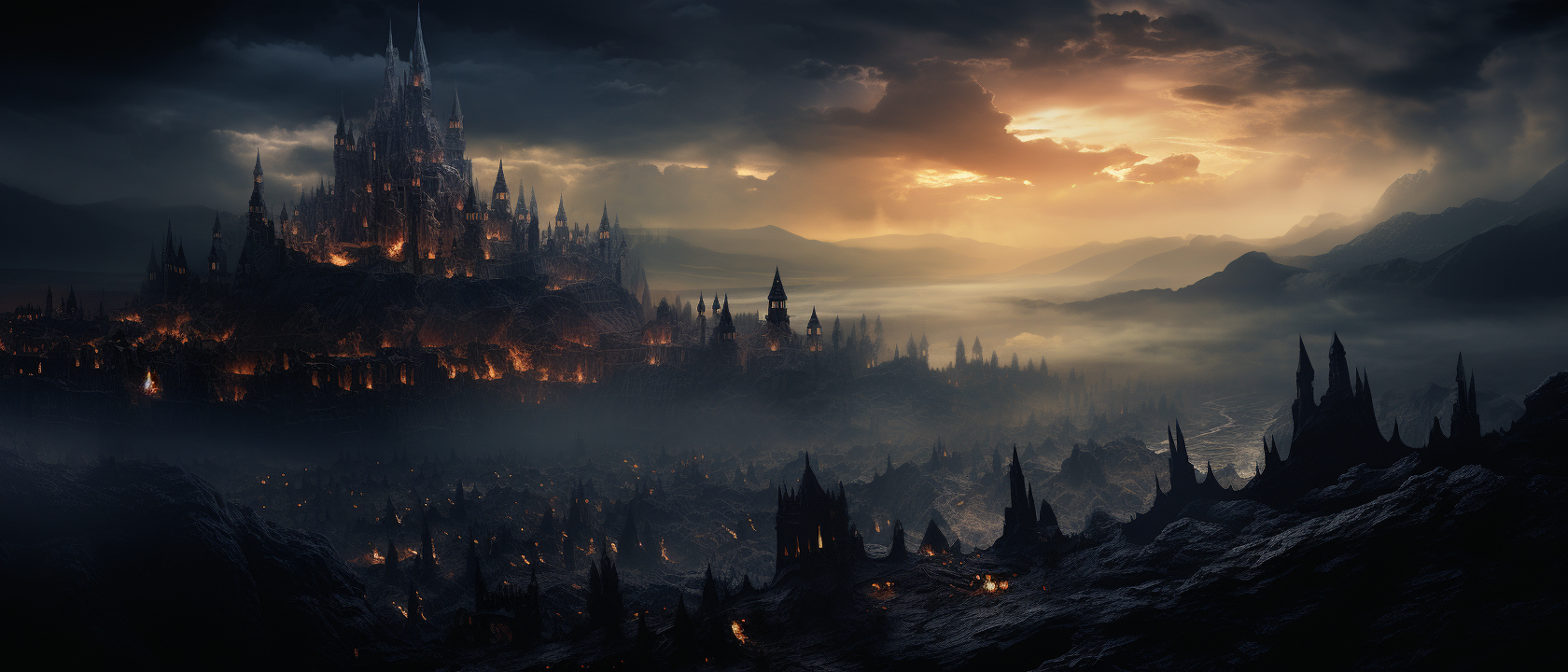
The Chocolate War was a war which was fairly unnoticed by many folks, specific the normal folks. The reason is very simple: a normal farmer or owner of a restaurant (if it is not a high class restaurant) can't pay for a fair amount of chocolate beans. Normally they pay for a cup of cocoa or a chocolate bar to very rare and special occasions.
It started like many wars started: with an attack. But lets see how it started, how it was going and how it has ended and take a look at the consequences during and after the war. The entire war spanned over a time of roughly fifteen years, so it was a slow-burning, hard-hitting war. And only got attention when troops were moving.
Disclaimer: in the next paragraphs there are several mentiones of "bandits". Those are not an entire gang of bandits, those are several smaller or larger bandit groups. Most of them got eradicated really quick, so they aren't mentioned with their name. Only one group is named and that is because they are the largest threat and the group which angered the Desertwalkers and royality the most.
It was slow at first. The Desertwalkers had the monopoly on the entire chocolate trade (and still have it) and that made a lot of people very angry. And greedy. They feared the response the might merchant guild would wield. At first. But over time the greed was to overwhelming for most.
The first attempts on getting hands on the coins of the Desertwalkers was to ambush the carriages with the boxes of gold. Some bandits did one or two raids successfully, then the Desertwalkers raised their troups which guarded the carriages and most bandits vanished in a clash of steel and flesh. Their bones still lying under the burning sun.
One would think that it was the end, but other greedy souls had other methods. Which resulted in ambushes, but this time they targeted the chocolate bean transports. They were rather successful during the first two years because the Desertwalkers had not the resources to guard their coinage and the beans. Which caused a priority problem and so they splitted their resources between both carriages at first.
That caused another problem: neither the beans nor the coinage were protected enough so some of the bandit groups joined forces and attacked both carriages, sometimes at the same time. They were successful in both attempts which caused a lot of anger in the leadership of the Desertwalkers until someone came up with the next solution: not two caravans, just one. Bring beans to the dealers, collect the payment and return to Mearis. It was a more timely investment because they had to protect one caravan, but the upside was: they only had to protect one caravan.
The consequence: prices rose, so the dealers had to rise their prices as well and ultimately nobility & royality paid the greater prices. Most restaurants and cafés stopped to offer chocolate-based stuff like drinks or cakes which irritated a lot of people at first, but no one frowned or batted an eye, because sometimes it was this way.
The attempt with only one caravan went really well for a time. More bandits tried to get their hands on the juicy beans or the hard coins and clashed against the battle-hardened guards and mounted troops. Which got pretty expensive over time because the guards - consistent of mercs and Desertwalkers - saw their opportunity to raise their prices. After three years which caused a slow-burning chain reaction.
The raising of the mercs prices was not so much of a problem. At first at least. Not per bean, not per box or bag. Restaurants, cafés, kitchens saw the raised prices, shrugged it off and worked as nothing happened. The customer would pay the price anyway.
Until they didn't anymore. It was a slow process. More and more people ordered something else to drink, to eat which was not chocolate-based. And because of the raised prices, places didn't buy chocolate beans anymore because the orders of chocolate-based products declined. Bakeries shifted their range of products away from chocolate to dough-and-cream-based products and only use chocolate to decorate them.
The vanishing of chocolate (be it as a cake, cookie, drink or bar) made a lot of people very angry. That caused two problems at the same time: people who haven't had enough money to buy chocolate before and therefore stole it couldn't steal it anymore because there weren't any (if not heavily protected). The other problem was that people with money contracted bandits, thieves and other creatures of the night (sometimes even Dragonborns and Garladans) to get their hands on the pricey chocolate beans.
Group by group ambushed the caravans and some got their greedy and bloody hands on the coins and mostly the precious beans. Which dried out the supply of mercenaries and the supply of coin. At some point two larger groups attacked the plantations and caused the Vacant to respond with a small army, killing every bandit in sight and put them on pikes in their camp. Some of them are still there.
Now there were other problems: mercenaries were rare these days, fighting for the Desertwalkers or the bandits / royal or nobel contractor. At this point it didn't matter anymore if the contractor was elvish, dwarvish, human or something else (even the Underlings loved a cup of hot chocolate) and it started the main part of the event which was later called "Chocolate War".
It was a mind game. A game of hide & seek. Of crafting plans and measurements against what lies in the desert and on the outskirts of the desert. Or the mountains. The dwarvish clans were no help because there were different factions. Some wanted to help, some wanted to help with profit and exclusive rights and some didn't want to help because it was not their affair.
It was a bit better with elves and humans, but they fought on both sides. The Silver Elves had the part on the bandits side. Their armour was good and they fought very well even under the burning sun, but nearly every group was outclassed by the longbows of the High Elves fighting on the side of the Desertwalkers.
The constant fighting drained a lot of resources from the giant which was the Desertwalker merchant guild, spawned mass graves all around the desert, the mountains and the borders and made a lot of people sad and angry.
During this time the Desertwalkers lost a lot of resources in flesh, provisions, gold and image. Which naturally raised the prices the sixth time since the beginning of the attacks eleven years ago.
The end came really fast and it started with the sixth increase of the prices. The raise rendered the price next to ninehundred percent which even the royalty felt and was not pleased with it. Not only humans, every royalty. A meeting was held during the three-frontier-battle where the armies of the Desertwalkers, bandits and a group called Snakehunters clashed in the north of Pisocenia. It was basically a diversion and most of the attending parties were on the same page as they departed.
Smithies ran hot, provisions were acquired, armies were raised and a small group of Esatini contracted. Their job was bloody, executed in the dark; in broad daylight; with spear and poison and arrows and daggers.
After two years the Esatini destabilised the enemies of the Desertwalkers enough that their leaders were ill-experienced and not prepared for whats coming. And what came was a response so large it was only overshadowed by the response to the fiend attack after the creation of the Spiral. The battle lasted for three days and nights. On the morning of the fourth day the remaining bandit forces yielded. Traitors were executed, examples stated, but the gros of the survivors could go home.
The Desertwalkers returned to their daily business, installed different alarm systems (like the red smoke mentioned here), negotiated new contracts with the dealers and manufacturers and bowed to the combined pressure of all nations. The prices decreased to a more reasonable level and now even normal people can afford a bit of chocolate with a bit of saving (and not suffering for it).
Some nations gave the Desertwalkers a huge amount of resources to replenish them, which ultimately lowered the price per box & bag. The fear of angering the Desertwalkers and create a response similar to the last time is still deeply rooted in the hearts of those who were there and those who heard of the events during the Chocolate War.
Nowadays the transports are well-guarded and attacks are seldom, but still happening. Mostly from people who doesn't know about the force which guards a caravan or who didn't heard the stories.
And the best part? Chocolate is still a luxurious good, but the price decreased in a way that more and more people can enjoy a hot cup of cocoa without saving up for months.
All text, ideas, plots and articles in this world are created by CrazyEddie & Morbvs. All media (pictures, videos, music and all variants of it) belongs to their respective owners unless stated otherwise. (Version of 1st January
2024
)
Cover image:
Koria Main Header
by
CrazyEddie via Midjourney
Comments
Please Login in order to comment!






I appreciate a war over luxury goods. That's a very real approach to a military conflict that not everyone would think of. Well done!
Thank you kindly, I hope the whole chocolate-article-train didn't make you (overly) hungry. ^-^